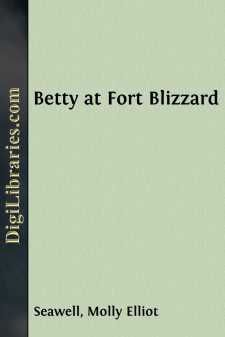Categories
- Antiques & Collectibles 13
- Architecture 36
- Art 48
- Bibles 22
- Biography & Autobiography 813
- Body, Mind & Spirit 142
- Business & Economics 28
- Children's Books 16
- Children's Fiction 13
- Computers 4
- Cooking 94
- Crafts & Hobbies 4
- Drama 346
- Education 46
- Family & Relationships 57
- Fiction 11829
- Games 19
- Gardening 17
- Health & Fitness 34
- History 1377
- House & Home 1
- Humor 147
- Juvenile Fiction 1873
- Juvenile Nonfiction 202
- Language Arts & Disciplines 88
- Law 16
- Literary Collections 686
- Literary Criticism 179
- Mathematics 13
- Medical 41
- Music 40
- Nature 179
- Non-Classifiable 1768
- Performing Arts 7
- Periodicals 1453
- Philosophy 64
- Photography 2
- Poetry 896
- Political Science 203
- Psychology 42
- Reference 154
- Religion 513
- Science 126
- Self-Help 84
- Social Science 81
- Sports & Recreation 34
- Study Aids 3
- Technology & Engineering 59
- Transportation 23
- Travel 463
- True Crime 29
Betty at Fort Blizzard
Description:
Excerpt
CHAPTER I
Colonel John Hope Fortescue, commanding the fine new cavalry post of Fort Blizzard, in the far Northwest, sat in his comfortable office and gazed through the big window at the plaza with its tall flagstaff, from which the splendid regimental flag floated in the crystal cold air of December. Afar off was a broad plateau for drills, an aviation field, and beyond all, a still, snow-bound world, walled in by jagged peaks of ice. It seemed to Colonel Fortescue, who was an idealist and at the same time a crack cavalry officer, that the great flag on the giant flagstaff dominated the frozen world around it, and its stars were a part of the firmament. When the sun rose and the flag was run up, then indeed it was sunrise. And when the sun descended in majesty, so the flag descended in glory.
As the last pale gleam of splendor touched the flag, the sunset gun cracked out suddenly. Colonel Fortescue and his right-hand man for twenty years, Sergeant Patrick McGillicuddy, rose to their feet and stood at "attention," as the flag fell slowly. Then it was reverently furled, and the color sergeant, with the guard, started toward the Colonel's quarters, all whom they passed making way for them and saluting the furled colors.
Colonel Fortescue continued to look out of the window, while Sergeant McGillicuddy, getting some belated mail together, passed out of the office entrance of the fine new commandant's quarters. Two horsewomen—Mrs. Fortescue, she who had been Betty Beverley, and her seventeen-year-old Anita—followed by a trooper as escort, were coming through the main entrance. Colonel Fortescue's eyes softened as he watched his wife and daughter, Mrs. Fortescue as slim as when she was Betty Beverley of old in Virginia, and riding as lightly and gracefully as a bird on the wing.
There were two other watchers besides the Colonel. These two stood at the drawing-room window. One was tall and black and kind-eyed, with the unquenchable kindness of the colored race. His official name was Solomon Ezekiel Pickup, but ever since Mrs. Fortescue, as Betty Beverley, had taken him, a little waif, forlorn and homeless and friendless, he had been simply Kettle, being as black as a kettle. He had watched and adored the baby days of "Marse Beverley," the straight young stripling now training to be a soldier at West Point, and Anita, the violet-eyed daughter, the adored of her father's heart, but Kettle had not come into his own until the two-year-old baby, John Hope Fortescue II, had arrived in a world which did not expect him, but welcomed him the more rapturously on that account. The new baby had taken everybody by surprise, and immediately acquired the name of the After-Clap. He coolly approved of his father and mother, and thought Anita an entertaining person when she got down on the floor to play with him. Naturally he was indifferent to his twenty-year-old brother, whom he had never seen, but Kettle—his own Kettle—was the beloved of the After-Clap's heart....


